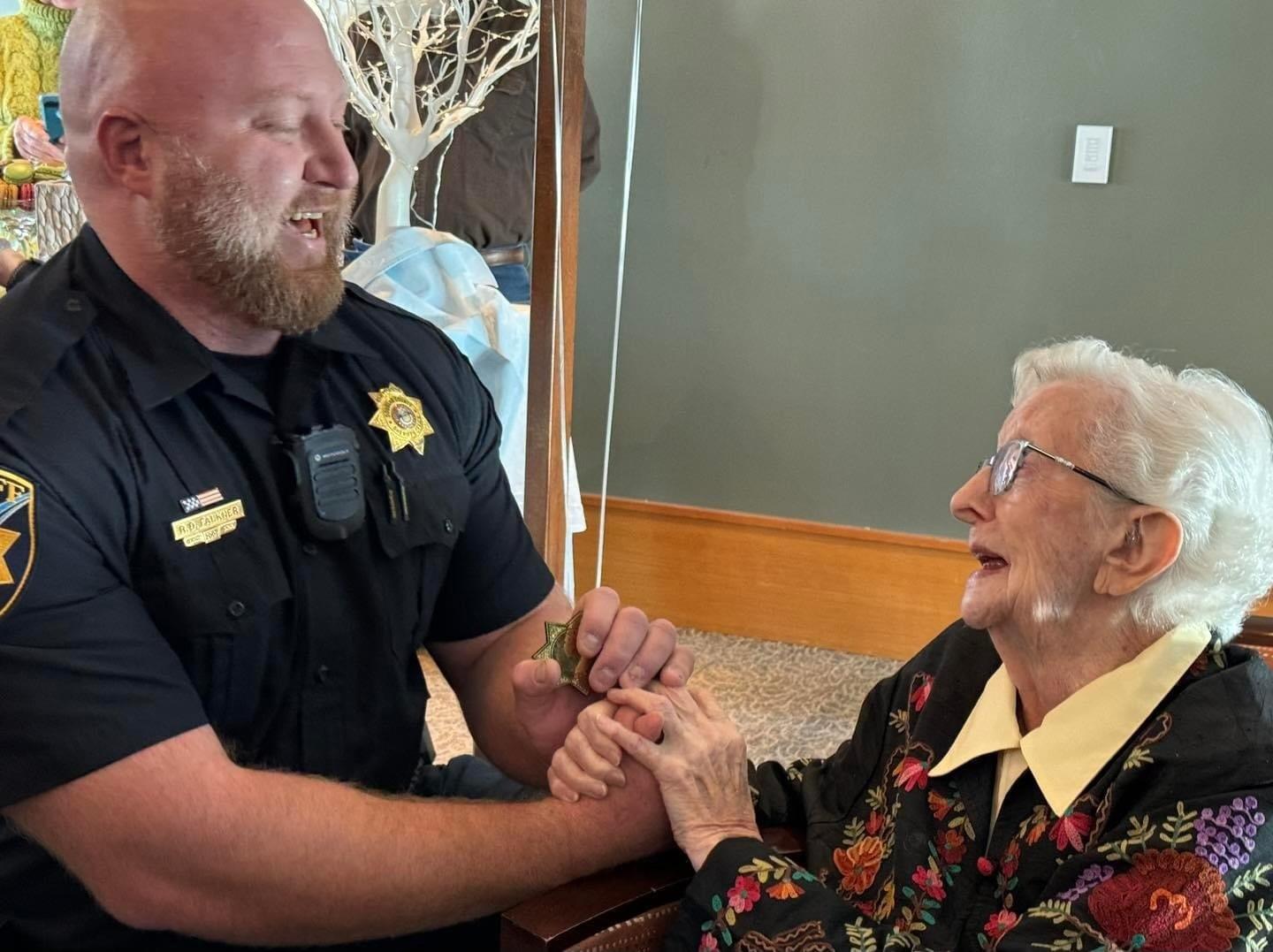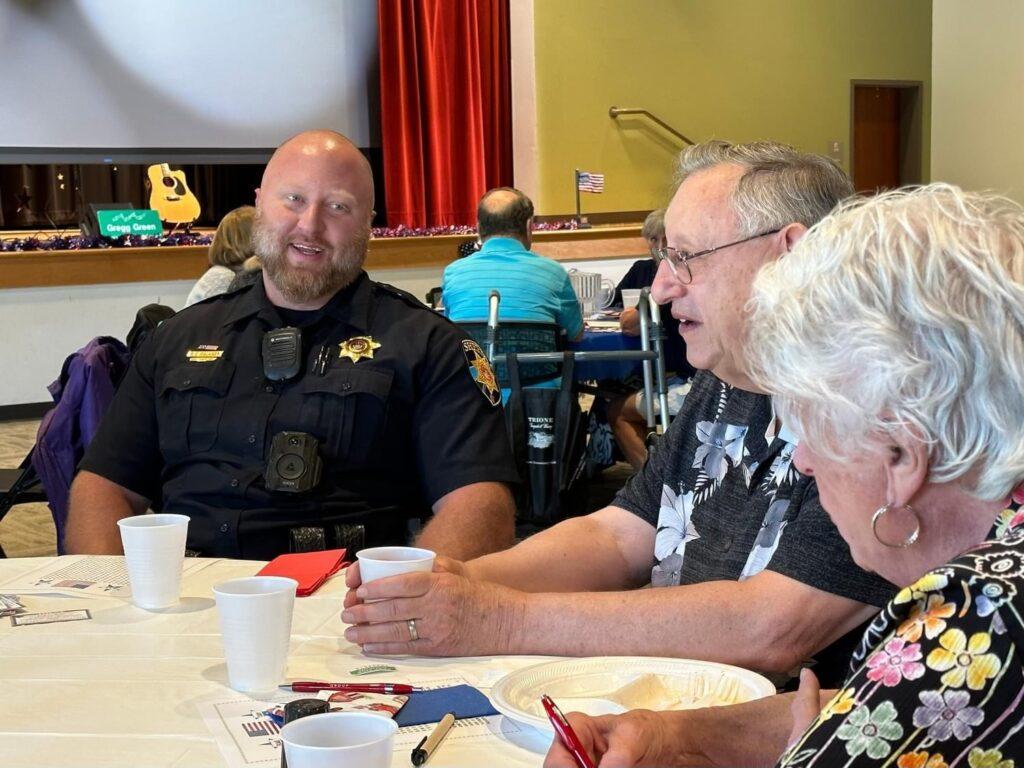
Scammers follow the money. And though research finds that 20-somethings are more likely to fall for fraud, it’s people over the age of 70 who lose the most cash.
That includes Jill Gibbens’ dad. He's in his 80s and lives in Aurora. First, a computer pop-up warned that he had a virus that would cost $5,000 to fix. He thought that sounded fishy and ignored it.
But then he got a call from someone claiming to be from his bank.
“A gentleman contacted him and told him that he was with the Canvas Credit Union Fraud department,” Gibbens said. “And that he was trying to catch these people that had contacted him prior. And he was about to catch them, but they were about to get my dad's money out of his bank account.”
The fraudsters stayed in contact with Gibbens' dad for two or three weeks straight.
“I think that it was just a psychological thing. They were working on him to get him to believe this,” she said. “And they finally talked him into going to the credit union in person, withdrawing $20,000 in cash, and taking it to a gas station in Aurora and putting it into an ATM machine where it was turned into Bitcoin and immediately locked into someone else's wallet.”
The money was gone. Her dad had been scammed.
Deputy Ryan Falkner of the Douglas County Sheriff's Office hears stories like this all the time. Falkner leads seminars that provide tips and resources to help older people avoid falling prey to fraud.
He spoke with Colorado Matters host Chandra Thomas Whitfield about how to spot various kinds of scams that often target older adults.
This story is a part of Aging Matters, a series from Colorado Matters about the Centennial State's aging population. Read more stories here.
Read the interview
This interview has been edited lightly for clarity and length.
Chandra Thomas Whitfield: Are you surprised by Jill Gibbons' story?
Deputy Ryan Falkner: No, actually, this is a very common scam that's going on in our county as well, in Douglas County. We call it the popup scam. What we recommend with these popup scams is turning off your computer. Sometimes even in the warning, it'll say, “Do not turn off your computer. You're going to cause more problems.” The reality is, it's going to be more problems for the scammer. Turn off your computer, unplug your computer. You're going to lose save documents, but that's much better than losing your finances.
Thomas Whitfield: Absolutely heartbreaking to hear that story. What's the number one fraud that you're hearing about right now?
Falkner: Right now in Douglas County, what we are seeing is the jury summons and warrants for your arrest scam. It's a phone scam typically that somebody calls, portraying an officer saying, "You missed jury's duty. You have a warrant for your arrest. You got to pay for it over the phone through gift cards. Crypto.” Unfortunately, we had five victims last week with numerous phone calls, so be on the lookout for that one.
| Whether you're aging yourself or caring for someone who is, what questions do you have? Email us at [email protected] or leave a voicemail at 303-871-9191 X 4480. |
Thomas Whitfield: Well, no one can see this in the studio, but my mouth is literally wide open, just concerned about this. Of course, tying this to your civic duty, which is part of what we consider being American, is serving in the jury system, and for someone to use that to steal.
Falkner: And that's what I love about our older adults especially, is that they take jury duty as a badge of honor. This is my civic duty, just like you said, and they take it very seriously and let's be honest, nobody wants to be arrested. So attaching that fear aspect onto it as well. A lot of people are just really nervous and it's like, what do I need to do to get rid of this problem? Pay gift cards. Okay, ‘whatever you need to do’ type deal. They'll threaten to say, “if you hang up on me, we're sending to the police after you right now,” and that's just not how law enforcement works.
Thomas Whitfield: What should you do? If you get a call like that?
Falkner: You should absolutely hang up. Never use the contact information they give you. Call a local law enforcement officer- myself, or just the sheriff's department, and ask to confirm this if you need verification.
Thomas Whitfield: Now, isn't there one that happened a lot during the holiday season with a text message?
Falkner: Yes, and that's what I call the packaging text message scam. Let's face it. All of us order something from Amazon. Scammers know this. So they'll send you a text message saying “Your package is delayed due to lack of billing information. Please click this link.” Once you click on it, you run the risk of a virus. But this particular one is just detailed information to include your credit card information, and once the bad guys have that, your finances are out.

Thomas Whitfield: Wow. Now we're in tax season. Does that open up a whole can of worms?
Falkner: Thank you for bringing that up. Some of these scams can be predicted, and so one thing I want your listeners to know is the IRS is not going to call you. They still do the mail system and they're definitely not going to threaten you. They'll try to work out some kind of payment plan if you need to. Social security won't contact you. All these entities will not contact you over the phone.
Thomas Whitfield: Very important to know that I'm hearing a common theme here. Slow down, take some time before you act. How much do scammers rely on the person they're targeting to make a snap decision? One that they might not have made it if they just slowed down and thought about it a little bit more.
Falkner: Well, these scammers are master manipulators. They don't want you to think, so they purposely try to speed up your thought process.
Thomas Whitfield: There's an urgency there.
Falkner: Yes, absolutely.
Thomas Whitfield: “Now you're going to get in trouble. You're going to be locked up. You're going to lose your money.”
Falkner: Absolutely. Another one is "Keep it a secret." We don't want to bring embarrassment to you. Or, the Publishers Clearing House scam: "Keep it a secret. We want to surprise everybody else." If a stranger is telling you to keep it a secret, that should be an indicator of saying, “I’d better tell somebody.” It's a trick that the scammers play, so they keep you in your primal state of mind and not in your logical mind. You reach out to other people, you get other opinions. Hopefully a good one. “Are you sure this is real? This sounds like a scam.” And that's all we need to break out of our parental state of mind.
Thomas Whitfield: I find that interesting because I remember years ago looking for a job, and of course you were kind of in an emotional state. You're trying to get a job. This is tied to your family and taking care of your family, and someone reached out about a job and they're like, "We want to interview you on Google Hangout."
And I was thinking, 'Am I outdated? I've never heard of this. And so you do it thinking, okay, what's the harm in the conversation?' And then this conversation turned into, 'Oh, we really like you. We need your information for direct deposit.' And I'm thinking, I've never had a job interview where it went straight to anything like that. But to your point, I did bring it up to a friend and he said, 'Oh no, this is very shady.' And of course, my alarms went off. But again, to your point, you talk about these things so someone can alert you that this doesn't sound right.
Falkner: Especially with our older adults, I always tell them, anything out of your comfort zone or your normal way of life should be very cautious.
Thomas Whitfield: Of course, all of these frauds can happen to anyone, but it seems like one way scammers are getting to older people in particular is through their grandchildren. Tell us more about that.
Falkner: Oh goodness. I am terrified of the grandchildren scam because of two words: AI. The robotic voices, they only need six words out of my mouth to mimic my voice. It is terrifying. This was a very popular scam before AI, but they had to overcome the hurdle.
Thomas Whitfield: So what is it? What do they say? That grandchild is in trouble?
Falkner: Yeah. Ultimately either arrested or got in a car crash, either which way, they need money. And that's the hurdle they get over is “You don't sound like my grandchild.” “Oh, I got in a car crash. I broke my nose.” Okay, that must make sense. “I really need money a lot. I'm arrested,” in this particular example. “I'm at the Douglas County Jail. My bond is $5,000. Can you wire me money?” And we all love our family. We all want to help them. And then here's the ‘secret’ too: “Don't tell mom, she's going to be really upset.”
So what I tell our older adults is, you did your job, you raised your daughter, and now it’s your daughter's responsibility to raise that grandchild. Secrets shouldn't be kept in a family. I'm not saying air it out to everybody. Don't put it on Facebook.
But at least address it within the family, especially that grandson's parents. “Hey, little Billy's in trouble. Do you know about this?” I would first call Billy, if Billy's in trouble. Now, here's what most people don't know. The first thing that's taken from you when you're arrested is your cell phone. So if Billy doesn't pick up, we can go either which way: He could be a teenager, right? Or he could be arrested. So we didn't get really an answer there. Then reach out to the parents. “Hey, have you seen Billy? I just got a weird call.”
A lot of times right there, that's where it ends. “I'm sitting next to Billy right now. Everything is fine.” Here's something that a lot of people don't know. Billy doesn't need that money. The courthouse does, the sheriff's office does. Billy can't access his funds in jail. So if you can't get ahold of anybody, contact that local jail, see if Billy's in there, and then see the proper ways of getting him bonded out.
Thomas Whitfield: And once this money is gone, usually there's nothing you can do to get it back. Right?
Falkner: It's very, very hard. It's extremely hard to get the money. Let's say you wired me money to my bank account. There is a track there, but then they quickly move it to another account and then another account and another account knowing that law enforcement is going to be delayed getting warrants after warrants after warrants. By the time they get the first warrant to check my bank account. It's probably in the fifth bank account already where law enforcement can't reach.
Thomas Whitfield: Let's talk about relationship scams, romance scams. How are people getting involved in that?
Falkner: Any social media site, to include dating sites, and they quickly build trust. I say it like this. I love my wife very much. She loves me. We are soulmates, but we don't agree on everything. These scammers tend to agree on everything you say to build that quick trust. “Oh my goodness, I found my soulmate. We agree on everything. I can't wait to meet up with them.”
Thomas Whitfield: Do they like what you like?
Falkner: Yeah. Even the oddest things, but they never find a way to meet up.
Thomas Whitfield: And many times, off-camera is the catfish thing.
Falkner: Yep.
Thomas Whitfield: It's like these are great pictures, but we never actually can see you on camera.
Falkner: Absolutely. And they'll come up with ridiculous things to avoid meeting you in person or FaceTiming you or anything like that. And so what we say is, never give them money until you actually meet them in person. Recognize, we're not saying never period, but until you see that they're a real person, and that relationship blossoms into something real, put some guidelines. Because let's face it, online dating is now the new bar scene.
And we have to have rules just like how we have rules when we go out to the bar, how to remain safe at the bar, how to remain safe on dating websites. And the best rule for this is no money until I meet you in person. They've gone through - and I tell our older adults this all the time - they have made it through their lives just fine without your money. They're not going to need your money until you guys actually meet no matter what the excuse is.
Thomas Whitfield: And I've read that some of these scammers actually read obituaries targeting those who've lost their partner.
Falkner: Yes. So now they're playing on that emotion factor too, right? You're already an emotional wreck going through this. “I know. I just have to reach out and say, I'm so sorry. Is there anything I can do for you? I'm a friend of a friend. Let's talk about this.” Let's build the trust real quick. Oh, by the way, a few months down the road: “I'm in financial trouble. Can you help me out? I know you just got a huge settlement or whatever it might be. Can you help me out?”
The relationship scams are horrible because these scammers are unbelievably patient. A lot of times they start off with low funds. “I need $50 for gas,” and then it moves up and up and up and up. The quicker the trust is built, the more money is asked for.
Thomas Whitfield: Do you ever catch these scammers?
Falkner: We do, but most of our scammers that we catch are family members, unfortunately.
Thomas Whitfield: Well, we're going to definitely have to talk about that. What are the concerns there in terms of those in your home or those who are in your family scamming someone, particularly a senior?
Falkner: Yeah, so it is so hard. We all love our family members and unfortunately, some family members are greedier than others. And when it comes to that time, the younger generations view your money, for instance, as their money. I hear it all the time. Our older adults: “My daughter doesn't want me to spend the money. She doesn't want me wasting their inheritance.” It's not their inheritance. First off, it's the grandparents' money that they've raised, that they have built, that they have got to live.
So establishing that sooner than later is always good. However, yes, a lot of family members come in, especially with scams. “Dad, you were a victim of an easy scam. That's why I need to be in charge of your finances.” And then they get ultimate control of finances and then give it to themselves. They'll still take care of their parents, but at a very low rate, the bare minimum, while they pocket everything.
Thomas Whitfield: What should you do if you find out that a relative has stolen from you?
Falkner: Report, report, report. We always say, report to the police department, sheriff's office, your local law enforcement, always report it. It doesn't mean that they're going to get in trouble. It might, I don't know. But what's wrong is wrong, and what's right is right. You never want to just brush it under the rug. If you feel comfortable, comfortable and safe, maybe talk to 'em, be like,’ that's not right, that's not cool.’ But the bottom line is, that family member stole from you just like a stranger did. It has to be reported. I know, just like everybody else knows, that scams are the most under-reported crimes of our century. We have to get an accurate number to address these issues as best as possible.









